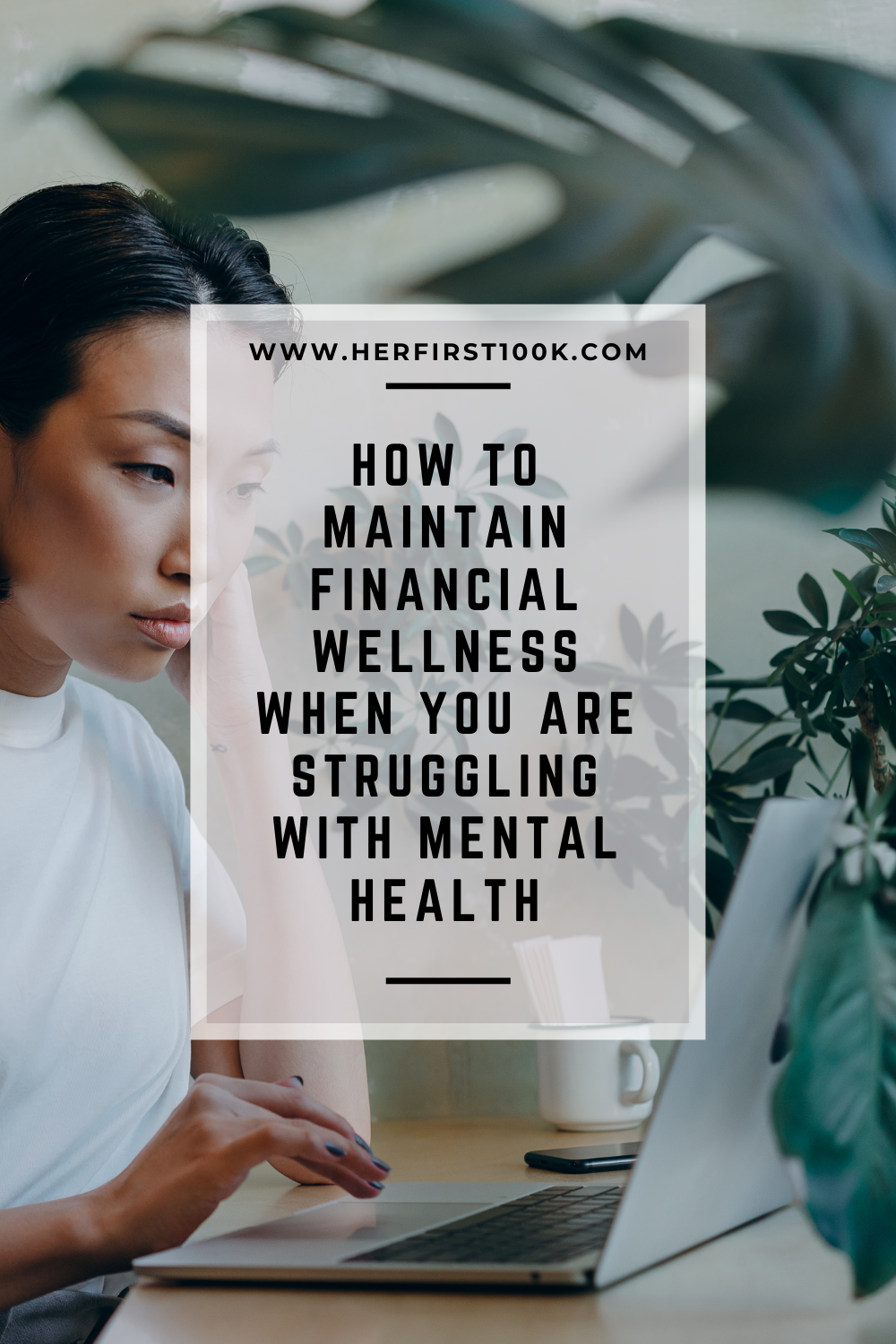The following article may contain affiliate links or sponsored content. This doesn’t cost you anything, and shopping or using our affiliate partners is a way to support our mission. I will never work with a brand or showcase a product that I don’t personally use or believe in.
How to Maintain Financial Wellness When You Are Struggling with Mental Health
You’re supposed to be sharing finance and career advice – why are you talking about mental health?
It’s a comment I’ve received many times in the past, and no hate – it’s a totally valid question! I’ve built a platform and community by teaching you how to reach your money goals, advance in your career, and plan for your financial future, all while taking down the patriarchy. Where does mental health fit into that mission?
I want to give our audience all of the resources they need to achieve financial wellness, and I want to do so with a holistic approach. That means that we can’t just examine how much you spend at Target or how much student loan debt you have – we have to look at the WHOLE picture of what contributes to your financial situation, habits, and mindset.
The reality is that our mental health affects every aspect of our life in a BIG way, and that includes our finances and career. In fact, when we take a holistic look at personal finance, it’s clear to see that our mental health has just as much of an impact on our lifelong relationship with money as our spending habits and credit utilization and, as such, it needs to be considered and prioritized in our journey to financial wellness.
With this in mind, I want to talk about how our mental and financial health goes hand-in-hand and give you the resources you need to maintain healthy financial habits even when you are struggling with your mental health.
Mental health affects our financial wellbeing
It’s no surprise that money and mental health are related. After all, who hasn’t felt anxiety about an upcoming bill, a sense of hopelessness when you see your student loan balance, or even the buyer’s buzz after an impulsive shopping spree?
But studies show that the way that our finances and mental health are linked goes far beyond these fleeting emotions.
A study by the Money and Mental Health Policy Institute found that financial difficulties are both a common cause and consequence of depression and that people who struggle with depression or anxiety disorders tend to have more difficulty managing routine financial tasks such as paying bills on time and maintaining a budget.
Additionally, many people who struggle with their mental health will use impulsive spending as a coping mechanism to distract themselves from everyday pressures and reduce negative feelings. Of course, many of us know all too well that once the high of emotional spending wears off, we often experience an emotional spending hangover and are overwhelmed by feelings of shame and guilt, which places us back at square one of the damaging cycle of emotional spending.
Read more about how mental health affects our financial well-being, here.
Unfortunately, the ways in which our mental health impacts our financial health do not stop at just our spending habits – it also affects our earning potential and professional opportunities.
People who struggle with their mental health are more likely to call in sick to work and for longer periods of time than their peers. Additionally, depression and anxiety are directly linked to a decline in energy, creativity, and productivity, all of which contribute to a general decline in workplace performance.
As a result, people who struggle with a mental health concern are two to three times more likely to be unemployed than their peers which, of course, leads to additional financial and mental strain. Talk about f*cking brutal.
Want to read more about how mental health impacts careers? Read about the true cost of mental health, here.
How to maintain financial wellness when struggling with mental health
With money and mental health being so intimately linked, it’s hard to wholeheartedly pursue one without also prioritizing the other. I know firsthand that this can be much easier said than done, especially if you have already found yourself in a place where you feel overwhelmed by financial stressors and mental health concerns.
As you navigate mental health and financial wellness, remember that this is not a sprint – it’s a lifelong journey that has hills and valleys and needs to be sustainable. The following advice and resources are meant to be tools that you can use and depend on for years to come. For the sake of avoiding overwhelm, please don’t feel that you have to plug them into your self-care routine all at once.
Small, consistent steps in the right direction will take you extremely far in your mental and financial wellness journey.
Proactively prioritize your mental health
If you’re struggling with money and mental health, it’s easy to think that you have to first get your personal finances under control in order to invest in your mental health. And while in many situations I would suggest getting a firm grasp on your personal finance before anything else, I make an exception when it comes to your mental health.
If you are in a mental place where you are overwhelmed with feelings of hopelessness, despair, and severe anxiety, getting into a more positive headspace is the utmost priority. Get plugged into therapy, talk to a doctor about medications that could help, join a support group, or download a meditation app.
Invest time and energy into yourself and your mental health without shame; everything else can wait until you are in a healthier headspace.
Eliminate the fear of the unknown
In the HFK Facebook Group, we often discuss mindset blocks that hold us back from achieving financial wellness. One that arises the most frequently is the “fear of the unknown.”
Whether it’s not knowing how much debt you have, how much money you have in the bank, or what your credit score is, the unknown can be a major source of stress, anxiety, and feelings of hopelessness.
Take this perspective from Kristen, who shared how she and her husband paid off $25,000 in credit card debt.
Kristen said, “The first step to paying off our debt was getting a thorough understanding of our debt. We had maintained an ‘ignorance is bliss’ mindset, but the reality is that the ignorance of our debt was actually a huge source of stress and anxiety.
We wrote down all of our debts, their balances, their interest rates, and their minimum payments. It was a really intimidating task, but once it was completed, we both felt so liberated.
Being able to see an exact number of what we owed put everything into perspective and allowed us to create an actionable plan so we could finally make progress towards paying off our debt.”
You can read about Kristen’s complete debt payoff journey here.
While it may seem difficult at first, getting a thorough understanding of your finances will ultimately relieve the anxiety of “not knowing” and will allow you to take actionable steps toward tackling your financial stressors.
I recommend taking yourself on a “Money Date” to help make this process as easy (and maybe even, dare I say, enjoyable!) as possible. Pour yourself a glass of wine or make a cup of tea, put on your comfy clothes, play some relaxing music, and spend some one-on-one time with your finances.
Write down your monthly income and expenses, as well as your total debts and their interest rates. This will help you start to understand where your money is coming from and going every single month so that you can plan accordingly and start working towards your financial goals. Then, repeat this Money Date monthly, so you can monitor changes and see your progress.
Want to learn more about the Money Date and other personal finance fundamentals? Check out my best-selling book, Financial Feminist, which will teach you how to spend mindfully, save money, and make a budget that aligns with your values.
Set your finances on “autopilot”
People who struggle with depression or anxiety are often more susceptible to experiencing feelings of overwhelm and despair. Add that predisposition to monthly bills, credit card statements, and notifications from your budgeting app, and it’s no wonder that people who struggle with mental health often feel overwhelmed by the financial demands of the day-to-day.
One of the best ways to reduce feelings of financial overwhelm is to make your finances as streamlined and automatic as possible so that they don’t require any of your time or mental power.
Set up automatic payments on as many bills as you can so that you’ll never fall behind on a payment all while saving mental energy. Set up an automatic transfer to your savings account so that you will make active progress towards your savings goals. You can even create an investing plan through my investing app, Stock Market School, and sign up for automatic reminders to invest without having to immerse yourself in the stock market day-in and day-out.
Basically, anything that you can do to eliminate the pressure of daily financial maintenance while still meeting your financial responsibilities will be of immense benefit as you dedicate your mental energy to improving your mental health and thus improving your financial wellbeing.






